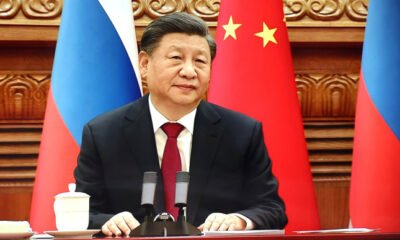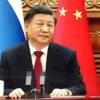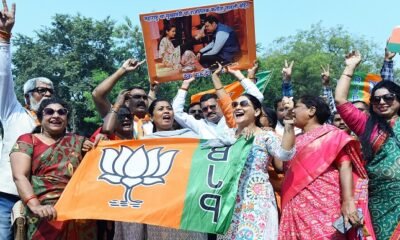Politics
Why India needs to Decouple from China?
New Delhi. Red Lantern Analytica, an international affairs observer group based at New Delhi organized an Expert Panel Webinar on ‘Why India Needs to Decouple from China: Understanding China’s Colonial Enterprise’ on December 24, 2020.
The panel was chaired by BJD parliamentarian Dr. Amar Patnaik and the list of eminent speakers included – Senior Fellow at Institute of Peace and Conflict Studies Abhijit Iyer Mitra; China expert and activist Kyle Olbert; Professor of Economics at Christ University Dr. Shalini Sharma; and Assistant Professor at UASN, Poland, Dr. Pradeep Kumar.
This discussion was moderated by Assistant Professor, Rashtriya Raksha University Jayraj Pandya.
RLA’s founder Abhishek Ranjan, a Public Policy Expert, opened the webinar by introducing the moderator and referred to the need to address the ‘dragon in the room’ as India looks towards decoupling from China.
In his opening remarks, Member of Rajyasabha (BJD) Dr. Amar Patnaik stressed on the need for a ‘quest for excellence’ as India plans to decouple from China. He argued that even though decoupling is the need of the hour, the path is difficult – which requires a complete overhaul of the manufacturing ecosystem of the country. India needs to enlarge its GDP and tap into the large market to be able to produce cost-competitive products that can rival China’s, and hence, develop its global supply chains.
Elaborating his thought on this, he argued, “Do we need to decouple? Yes! India and the whole world has recognised that. How to decouple? Reduce the trade imbalance India has with China and reduce the dependency on China.
Abhijit Iyer Mitra, while appreciating the need for decoupling, argued that the path is laden with difficulties for India. He said that technically, the conversation of decoupling starts in the West. China only accounts for 0.9% of inwards investment into the US and 3% of inwards investment into the EU. China’s trade with the US and EU combined equals the amount of trade carried out between the US and EU. In terms of trade flows, China is important to the West. But in terms of investment flows, it is not! This is the starting point for a Western decoupling from China. The West is the technology supplier to China, either it is legal technology transfer, like Apple setting up a factory in China, or it is stolen technology which China is extremely good at. China has a much lower per capita income than the West and is a middle-income economy.
Dr. Shalini Sharma, through her presentation, argued that even though the path of decoupling is a difficult one, India is well on its way to achieving success in it. She pointed out to various successes of the government policies and projects like Make in India and Atma Nirbhar Bharat, which have given a huge impetus to startups in India. She noted that India is also attracting global value chains and that the Foreign Direct Investment (FDI) inflows have increased in recent times as a result of these policies.
India needs to break its dependence on China. As per the latest data, during the pandemic period, India’s exports to China have risen to 6.5% and imports from China have decreased. There are multiple projects in India currently that are aiding India’s efforts to decouple from China.
Mr. Kyle Olbert, through his comprehensive presentation, highlighted that the need for decoupling emerges due to the strategic concerns that India has against China. He observed that China is following Alfred Thayar’s strategy of “who controls the seas” and that India should be wary of China’s naval network and the String of Pearls strategy to encircle India. He further noted that China being an authoritarian state has a disregard for human rights like the right to privacy and therefore, India should not allow Chinese companies to access its data at any cost.
He further highlighted, “India’s hopes until recently lied with Port of Chabahar located in Iran. India had hoped that India, Afghanistan, and Iran would develop the Chabahar Port and built an economic corridor. But China intends to use the port of Gwadar in ‘Occupied Balochistan’ to project its military power across the Chabahar Port. China has also recently signed a major deal with Iran. This further dash India’s hope for an economic corridor.
In its attempts to box India, China has turned ‘Occupied East Turkistan’ into a ‘Gulag’ comprising of multiple labour camps, prisons, and concentration camps. This process is likely to repeat itself wherever China goes because the Chinese Communist Party (CCP), by nature, is an authoritarian and totalitarian regime. There is not only a military imperative for India but also a human rights imperative to decouple from China.”
On China’s expansionism through technology, Olbert argued, “Modern China is not a nation; it is a prison of nations. China is built on oppression and is held together by the force of the state and the CCP. China is essentially a prison for anyone within its borders. China is a threat unlike the world has ever seen before. China has also come up with a new strategy is to control cyberspace. China’s rollout of 5G technologies, as well as fibers, is an effort to control data chokepoints. Data is the new resource and China is collecting. China’s data is locked behind the Great Firewall, but China has free access to the world’s data through data brokers. These data brokers collect data through online surveys and through cookies on websites which we visit. They then make a profile and then sell this data. The main problem is that we do not know where they sell this data to. They could be selling it to China, but we would never know.”
Dr. Pradeep Kumar noted that India needs not just economic decoupling from China, but also cultural and security decoupling from it. He further elaborated, “Why are we talking about decoupling with China today? For several decades, India and China had no casualties of soldiers on the border. India and China, both knew that if peace was maintained at the border, then both the countries could continue their relationship. But if the peace at the border cannot be maintained, then that will negatively affect all other aspects of India’s relationship with China. China, in recent months and weeks, has been trying to dictate terms to India and has been trying to unilaterally decide the border demarcations. China is essentially trying to tell India that it has to accept China’s hegemony. These actions have led us to the topic of decoupling with China. India is reacting to China’s hostile actions and is rejecting China’s hegemony. Trade between India and China is high but in terms of imports and exports, there is a deficit and India is not yet competitive in relation to Chinese goods. India has to take a hard stand against China in terms of the military as well as in the economic sphere. Taking a hard stance against China on the border but continuing economic dependence on China sends a very wishy-washy statement.”
Following the discussion, the moderator summarized the key takeaways from the discussion. Subsequently, he undertook a Q&A session, where audience asked questions to the panelists related to the strategic framework needed for India, the legislative and administrative interventions required, the educational deficit in India, and the EU’s response against China.
The webinar closed with a vote of thanks by Media Adviser of RLA Karneet Bhasin, wherein she highlighted the importance of the topic and thanked the panelists and the audience for making the event a success.




















